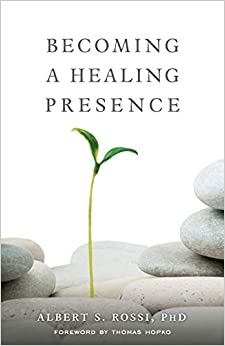Dr. Albert S. Rossi is the resident clinical psychologist at St. Vladimir’s Orthodox Theological Seminary in Yonkers, New York, and the professor of pastoral theology at the seminary. In his book, Becoming Healing Presence, Dr. Rossi tells us that we are called to love our neighbor, and one means to do so is to give them the healing and peace of Jesus Christ. To become this healing presence for others we must first be continuously healed and renewed ourselves through an active relationship with Jesus because we cannot pass on that which we do not possess. In the book, Dr. Rossi points the way toward deepening our love for God and for each other so that others may experience Christ through us. For Dr. Rossi, the key to becoming a healing presence is simply to “Be still, and know that I am God.” (Psalm 46:11). For it is only in still waters (Psalm 23:2) that we can both see beyond the surface and also see a reflection of ourselves. This Eastertide study covers nine weeks.
(Easter 2018)
Becoming a Healing Presence – Dr. Albert S. Rossi
To become this healing presence for others we must first be continuously healed and renewed ourselves through an active relationship with Jesus because we cannot pass on that which we do not possess.
We have the example of Elijah who looked for God in the activity of the whirlwind, the power of the earthquake, and the excitement of the fire; but who only heard God in that still, small voice of sheer silence. 1 Kings 19:12.
The cultivation of God’s peace and God’s love within us begins with us intentionally seeking an inner stillness that opens us to contemplative prayer and through contemplation to be transformed and through transformation to be able to go out to others.
As we slow down to hear our breathing and become aware of God’s presence, we begin to be attentive and see and hear God all around us. As Jesus says “blessed are your eyes, for they see, and your ears for they hear.” Matt 13:16.
The more effective method of combating our restless thoughts is to redirect our thoughts away from their object and towards Jesus through the repetition of a short Jesus-focused prayer.
Our heart is seen as that place where God finds us.
Prayer should take us to that place of being both wholly within ourselves and with God. For as Jesus teaches, the Kingdom of God comes not with an observation so that we can say it is here or it is there, rather the Kingdom is within you. Luke 17:20-21.
Our vocation is to see the world as God sees it and to bring the healing presence of the love of Jesus Christ to those in need. Our vocation is simply to be a healing presence to those around us.
Sanctity is a process of subtraction. We need to subtract our sinful nature and our agenda in order to get us our of God’s way and allow him to work in us.
The homework this week is to be aware of those situations in which we have been treated by others with the gentleness of Christ and how we have treated others with the gentleness of Christ.
Gentleness respects boundaries. Being gentle means allowing others to live their own lives and carry their own burdens. We are to be a healing presence to others, not their savior.
Surrender is not a passive capitulation, rather it is a “receptive engagement with the present.”
God is eternally present. Therefore, it is only in our experience of the present that we “have the experience God has of reality as a whole.”
This more ancient understanding of a sacrament includes anything that communicates and manifests God’s grace. Think about how the present moment is sacramental. How does being present make us one with God’s grace?
The stumbling block to Jews and foolishness to Gentiles is that therefore God also suffers and dies as we do. God still doesn’t provide us with the answer, but he does say 1) that he has suffered as we have suffered, and 2) death and suffering are not the end.
Memento, Mori (Remember, thou art mortal)
Part of being a healing presence and living in the present moment requires us to understand that, most of the time, we simply do not understand.
Like Schrodinger’s Cat, we need to recognize and embrace the ambiguity we encounter in our spiritual lives and in our relationships with other.

